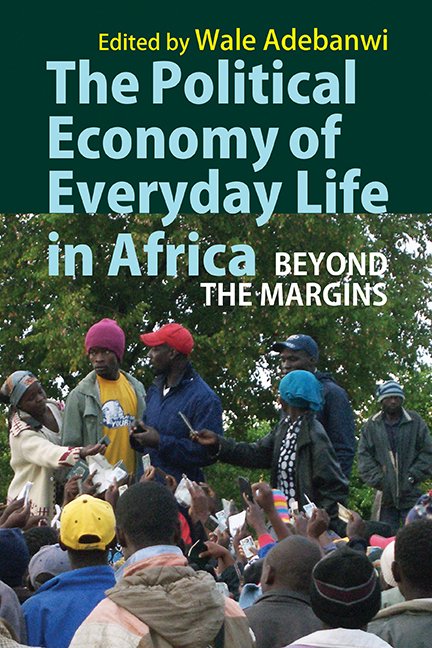Book contents
- Frontmatter
- Dedication
- Contents
- Maps, Illustrations & Tables
- Notes on Contributors
- Foreword
- Acknowledgements
- Approaching the Political Economy of Everyday Life An Introduction
- Part I MONEY MATTERS: CURRENCY & FISCAL LIFE STRUGGLES
- Part II LABOUR, SOCIAL LIVES & PRECARITY
- Part III MARGINALITY, DISAFFECTION & BIO-ECONOMIC DISTRESS
- 7 Precarious Life Violence & Poverty under Boko Haram & MEND
- 8 The Debt Imperium Relations of Owing after Apartheid
- 9 Marginal Men & Urban Social Conflicts Okada Riders in Lagos
- 10 opona, Social Relations & the Political Economy of Colonial Smallpox Control in Ekiti, Nigeria
- Part IV HISTORICITY, TEMPORALITY, AGENCY & DEMOCRATIC LIFE
- Afterword: The Landscapes Beyond the Margins Agency, Optimization & the Power of the Empirical
- Index
9 - Marginal Men & Urban Social Conflicts Okada Riders in Lagos
from Part III - MARGINALITY, DISAFFECTION & BIO-ECONOMIC DISTRESS
Published online by Cambridge University Press: 31 August 2018
- Frontmatter
- Dedication
- Contents
- Maps, Illustrations & Tables
- Notes on Contributors
- Foreword
- Acknowledgements
- Approaching the Political Economy of Everyday Life An Introduction
- Part I MONEY MATTERS: CURRENCY & FISCAL LIFE STRUGGLES
- Part II LABOUR, SOCIAL LIVES & PRECARITY
- Part III MARGINALITY, DISAFFECTION & BIO-ECONOMIC DISTRESS
- 7 Precarious Life Violence & Poverty under Boko Haram & MEND
- 8 The Debt Imperium Relations of Owing after Apartheid
- 9 Marginal Men & Urban Social Conflicts Okada Riders in Lagos
- 10 opona, Social Relations & the Political Economy of Colonial Smallpox Control in Ekiti, Nigeria
- Part IV HISTORICITY, TEMPORALITY, AGENCY & DEMOCRATIC LIFE
- Afterword: The Landscapes Beyond the Margins Agency, Optimization & the Power of the Empirical
- Index
Summary
Many of us (okada riders) are not happy with the ban because we see okada business as the only thing we could do. No need of any capital base and it's very lucrative. There are some of us who conspire with armed robbers and other criminals like hired killers for the sake of money from okada charter. (Moyo Fabiyi P.M. News 20 November 2012)
We have okada too in Rwanda. It is a lucrative business. A good number of people are doing okada business in Rwanda. But their activities are well-regulated. There are rules and regulations that define the limit of their operation. We also organise them into groups, such as association of owners and association of operators. The groups help in ensuring that the rules and regulations are duly observed. Because we have rules, institutions and structures in place, we do not have much problem with okada operators. (Rwandan President, Paul Kagame, quoted in Ilevbare 2013)
@desmondc03: FOOTBALL inside POLITICS: Governor Fashola who's a Manchester untd fan has rendered 80 per cent of Chelsea fans (okada rider) jobless in Lagos. (Nwachukwu Egbunike 2012)
‘Struggle’ Economy & City Life
In her preface to the important volume, Money Struggles and City Life, Jane Guyer (2002: ix-xvi) raises interesting questions about the ways in which those of us who live and work in urban Africa witness what de Certeau (1984) describes as the ‘practice of everyday life’, which ‘encompasses systems of employment, provisioning, and meaning-making of impressive magnitude and relentless resilience’ (Guyer 2002: ix). In reflecting on the ‘domain of human struggles and achievement’ – particularly in Ibadan and other urban centres in southern Nigeria – within which ‘chronic uncertainty is pervasive’ (ibid.: x), Guyer argues that ‘(c)ase studies have to be a source both of data for analysis and of witnessed documentation of the realities of life’ (ibid.). In this chapter, I take up the task that she commended to African(ist) scholars in the ‘context of the intellectual and empirical challenges’ of 1990s Nigeria by focusing on an otherwise marginal phenomenon, albeit one that reflects the deep crisis of urban life in Africa in the post-structural adjustment era – an era which still bears not only the structural, economic, including fiscal, and social disasters imposed by Structural Adjustment Programmes, but also dramatizes the consequences of authoritarian rule with its attendant lack of urban planning.
- Type
- Chapter
- Information
- The Political Economy of Everyday Life in AfricaBeyond the Margins, pp. 239 - 265Publisher: Boydell & BrewerPrint publication year: 2017
- 1
- Cited by

